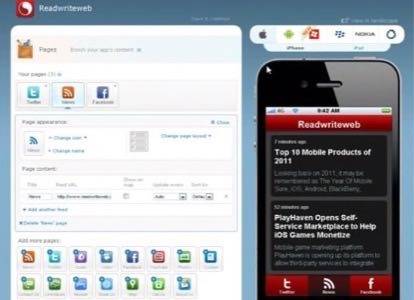The threshold for creating mobile apps is as low as it is ever going to be. New services are being designed every day to give the average person the capability to create a mobile app, even if they do not know how to code. The problem is that many of these services create a cookie-cutter app that many fear will drive Web design back to the dark ages of the mid-to-late 1990s when static, uninspired websites ruled the land.

One company, Conduit, is both contributing to this phenomenon and trying to do something about it. Conduit is releasing a new suite of mobile app building tools for the programming-challenged designed to not only make it easy to create apps, but make then stylish and dynamic as well.
The new Conduit app building suite allows for easy creation of iOS, Android, Windows Phone and Web apps using HTML5. The general premise is that you can take any website, plug it into the Conduit engine and it will create the app for you. It can create social layers for sharing, bring in audio for albums within an app, update content seamlessly, geo-target push notifications and generate QR codes.

This is the second iteration of the Conduit platform. The company has made a clever decision and is releasing the suite free to the public. That certainly sets the bar low for app creation. Would-be developers add the website they wish to turn into a mobile app and Conduit imports the data from that site, color templates and all. Templates can be edited to users’ preferences. New in this suit are Twitter and Facebook layers that can import news feeds and video that can be viewed straight from the app. There is also SoundCloud integration, making audio a fairly easy element to integrate.

We wrote about another do-it-yourself app builder called FiddleFly in September and were not that impressed with the cut-and-paste nature of the app builder. Boilerplate, iBuildApp, and Duda Mobile also have Web-to-mobile app creation tools. Conduit takes the functionality of these other builders and adds extra layers of refinement.
After an app is built in the Conduit suite, it is then easy to publish that app by just choosing what platform to publish on. Send it to the Apple App Store or Android Market with a click. That kind of functionality gives Conduit a leg up. In theory, it works much like a wrapper, the same way that Facebook wraps its mobile website to publish to the Android Market or the App Store. PhoneGap does much the same thing, just on a more sophisticated scale.
While Conduit can make dynamic apps, nothing can really replace a knowledgeable developer that can make design decisions, use specific SDKs and APIs, create an interesting user interface and tie it to the cloud. What Conduit is good for is helping businesses turn their websites into mobile apps or helping publications do the same thing. Turn your WordPress blog into an app? That is what Conduit does.
Developers and designers – what do you think of the do-it-yourself app building model? Will it lead to a generation of unimaginative apps or is this a paradigm shift in the developer world? Let us know what you think in the comments.

















